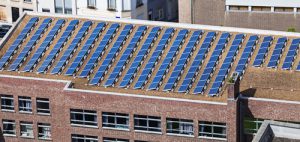
U.S. Sen. John Hoeven (R-ND) on July 26 reintroduced a bipartisan bill that would end a national ban on using fossil fuels in federal buildings.
“Promoting energy efficiency helps reduce costs over time while also improving environmental stewardship,” Sen. Hoeven said. “We can achieve this goal in a cost-effective way, but not with one-size-fits-all mandates.”
The All-of-the-Above Federal Building Energy Conservation Act of 2018, S. 3295, would allow federal buildings to continue using efficient fuels, such as natural gas, rather than phasing them out, while at the same time boosting the energy efficiency standards for government buildings, according to a summary provided by the senator’s office.
“Our bill creates flexibility for federal building managers, ensuring both new and existing facilities have significantly reduced energy consumption and deliver a good value to taxpayers,” Sen. Hoeven said.
U.S. Sen. Joe Manchin (D-WV) cosponsored S. 3295. Both lawmakers serve on the U.S. Senate Energy and Natural Resources Committee, which has received the bill for consideration.
If enacted, S. 3295, according to the senator’s summary, most notably would repeal Section 433 of the Energy Independence and Security Act of 2007 that includes a rule to eliminate all fossil fuel-generated energy from all new or renovated federal buildings by 2030.
The U.S. Department of Energy (DOE) published a draft rule in the Federal Register in October 2010, but a final rule is on hold because there’s no path to compliance after the first few years of implementation, according to the American Public Gas Association, which supports Congress substantially modifying or eliminating the ban in Section 433.
S. 3295 also would support utilization of energy management systems in federal facilities; focus on buildings that require updates; and ensure major renovations bring existing facilities up to the federal 30 percent less energy use than code standard, among other provisions. DOE would be directed under S. 3295 to define ‘major renovation’ through an open comment process, according to the summary.
Congress had considered similar repeal language in 2016, according to the Governors’ Wind and Solar Energy Coalition. The group noted that previous language from Sens. Hoeven and Manchin garnered support from utility groups, natural gas organizations and other energy-efficiency advocates after the lawmakers introduced a similar proposal in 2013 and 2015.



